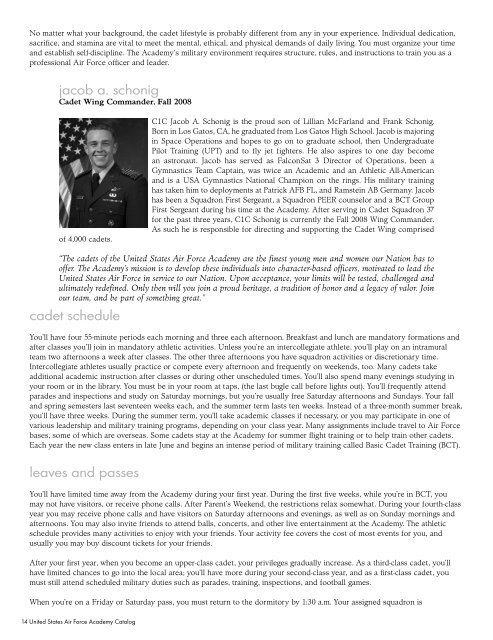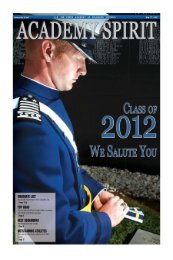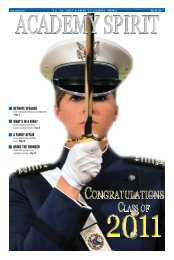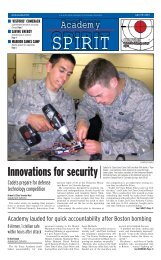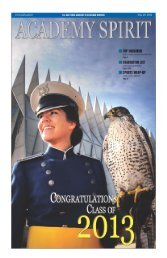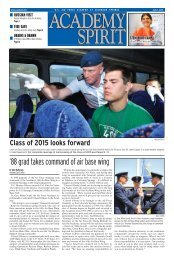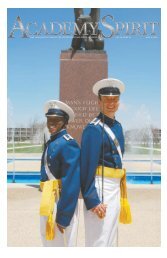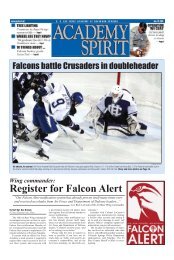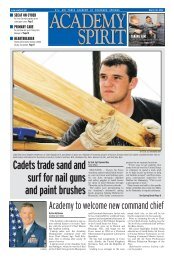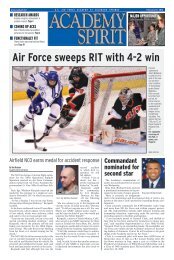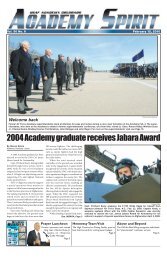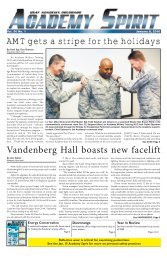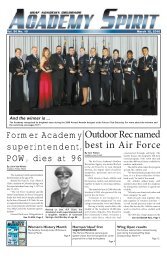2008-2009 Catalog - United States Air Force Academy
2008-2009 Catalog - United States Air Force Academy
2008-2009 Catalog - United States Air Force Academy
Create successful ePaper yourself
Turn your PDF publications into a flip-book with our unique Google optimized e-Paper software.
No matter what your background, the cadet lifestyle is probably different from any in your experience. Individual dedication,<br />
sacrifice, and stamina are vital to meet the mental, ethical, and physical demands of daily living. You must organize your time<br />
and establish self-discipline. The <strong>Academy</strong>’s military environment requires structure, rules, and instructions to train you as a<br />
professional <strong>Air</strong> <strong>Force</strong> officer and leader.<br />
jacob a. schonig<br />
Cadet Wing Commander, Fall <strong>2008</strong><br />
of 4,000 cadets.<br />
C1C Jacob A. Schonig is the proud son of Lillian McFarland and Frank Schonig.<br />
Born in Los Gatos, CA, he graduated from Los Gatos High School. Jacob is majoring<br />
in Space Operations and hopes to go on to graduate school, then Undergraduate<br />
Pilot Training (UPT) and to fly jet fighters. He also aspires to one day become<br />
an astronaut. Jacob has served as FalconSat 3 Director of Operations, been a<br />
Gymnastics Team Captain, was twice an Academic and an Athletic All-American<br />
and is a USA Gymnastics National Champion on the rings. His military training<br />
has taken him to deployments at Patrick AFB FL, and Ramstein AB Germany. Jacob<br />
has been a Squadron First Sergeant, a Squadron PEER counselor and a BCT Group<br />
First Sergeant during his time at the <strong>Academy</strong>. After serving in Cadet Squadron 37<br />
for the past three years, C1C Schonig is currently the Fall <strong>2008</strong> Wing Commander.<br />
As such he is responsible for directing and supporting the Cadet Wing comprised<br />
“The cadets of the <strong>United</strong> <strong>States</strong> <strong>Air</strong> <strong>Force</strong> <strong>Academy</strong> are the finest young men and women our Nation has to<br />
offer. The <strong>Academy</strong>’s mission is to develop these individuals into character-based officers, motivated to lead the<br />
<strong>United</strong> <strong>States</strong> <strong>Air</strong> <strong>Force</strong> in service to our Nation. Upon acceptance, your limits will be tested, challenged and<br />
ultimately redefined. Only then will you join a proud heritage, a tradition of honor and a legacy of valor. Join<br />
our team, and be part of something great.”<br />
cadet schedule<br />
You’ll have four 55-minute periods each morning and three each afternoon. Breakfast and lunch are mandatory formations and<br />
after classes you’ll join in mandatory athletic activities. Unless you’re an intercollegiate athlete, you’ll play on an intramural<br />
team two afternoons a week after classes. The other three afternoons you have squadron activities or discretionary time.<br />
Intercollegiate athletes usually practice or compete every afternoon and frequently on weekends, too. Many cadets take<br />
additional academic instruction after classes or during other unscheduled times. You’ll also spend many evenings studying in<br />
your room or in the library. You must be in your room at taps, (the last bugle call before lights out). You’ll frequently attend<br />
parades and inspections and study on Saturday mornings, but you’re usually free Saturday afternoons and Sundays. Your fall<br />
and spring semesters last seventeen weeks each, and the summer term lasts ten weeks. Instead of a three-month summer break,<br />
you’ll have three weeks. During the summer term, you’ll take academic classes if necessary, or you may participate in one of<br />
various leadership and military training programs, depending on your class year. Many assignments include travel to <strong>Air</strong> <strong>Force</strong><br />
bases, some of which are overseas. Some cadets stay at the <strong>Academy</strong> for summer flight training or to help train other cadets.<br />
Each year the new class enters in late June and begins an intense period of military training called Basic Cadet Training (BCT).<br />
leaves and passes<br />
You’ll have limited time away from the <strong>Academy</strong> during your first year. During the first five weeks, while you’re in BCT, you<br />
may not have visitors, or receive phone calls. After Parent’s Weekend, the restrictions relax somewhat. During your fourth-class<br />
year you may receive phone calls and have visitors on Saturday afternoons and evenings, as well as on Sunday mornings and<br />
afternoons. You may also invite friends to attend balls, concerts, and other live entertainment at the <strong>Academy</strong>. The athletic<br />
schedule provides many activities to enjoy with your friends. Your activity fee covers the cost of most events for you, and<br />
usually you may buy discount tickets for your friends.<br />
After your first year, when you become an upper-class cadet, your privileges gradually increase. As a third-class cadet, you’ll<br />
have limited chances to go into the local area; you’ll have more during your second-class year, and as a first-class cadet, you<br />
must still attend scheduled military duties such as parades, training, inspections, and football games.<br />
When you’re on a Friday or Saturday pass, you must return to the dormitory by 1:30 a.m. Your assigned squadron is<br />
14 <strong>United</strong> <strong>States</strong> <strong>Air</strong> <strong>Force</strong> <strong>Academy</strong> <strong>Catalog</strong>


